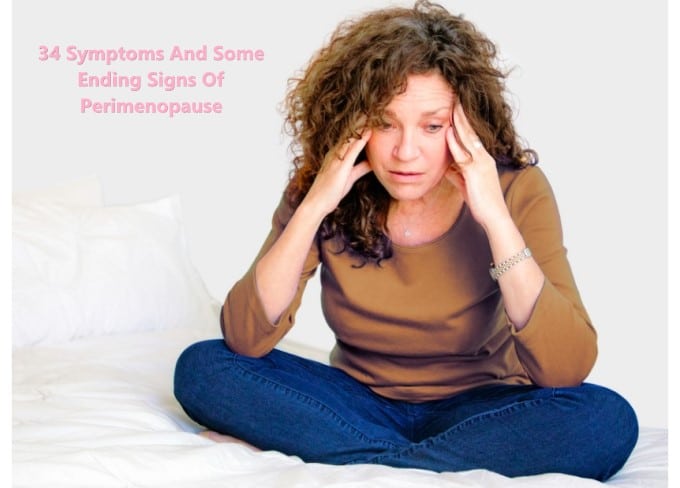Perimenopause is the transitional phase before menopause when the ovaries gradually reduce estrogen production. This period can last several years, and for many women, it comes with a wide range of physical, mental, and emotional changes. While every woman’s experience is different, experts have identified 34 common symptoms that are often associated with perimenopause.
Understanding these symptoms can help you recognize what’s happening in your body and manage it more confidently. Here’s a detailed breakdown of what each of these signs might mean:
Top 10 Early Symptoms of Perimenopause
1. Hot Flashes
One of the most recognizable perimenopause symptoms, hot flashes feel like a sudden wave of heat in your upper body, often followed by sweating and sometimes dizziness.
2. Night Sweats
Similar to hot flashes, but they occur during sleep and can lead to soaked sheets and disrupted rest.
3. Irregular Periods
Your cycle may change in frequency, flow, or duration. Periods might become heavier, lighter, closer together, or farther apart.
4. Sleep Disturbances
Falling asleep or staying asleep becomes difficult. Hormonal shifts and night sweats both contribute to poor sleep quality.
5. Mood Swings
Fluctuating hormones may cause you to feel irritable, angry, or overly emotional without warning.
6. Anxiety
Increased feelings of worry or nervousness may occur, even without a clear reason. This often goes hand-in-hand with mood swings.
7. Depression
Hormonal dips can impact serotonin levels, sometimes leading to long periods of sadness or low energy.
8. Fatigue
Even with enough rest, many women feel unusually tired during perimenopause due to hormonal changes and poor sleep.
9. Brain Fog
This refers to memory lapses, poor concentration, or mental confusion. It’s a common complaint linked to changing estrogen levels.
10. Memory Lapses
Forgetting names, misplacing items, or losing your train of thought can happen more frequently.
Common Physical Symptoms You Might Notice
11. Weight Gain
Weight may shift toward the midsection due to metabolic changes and declining estrogen.
12. Bloating
Hormonal changes can slow digestion and cause bloating, similar to PMS, but more frequent.
13. Digestive Issues
Constipation, gas, and indigestion may become more noticeable due to slower metabolism and sensitivity.
14. Breast Tenderness
Your breasts might feel swollen or sore, just like during PMS, but with more irregular timing.
15. Vaginal Dryness
A decrease in estrogen leads to less lubrication and elasticity, causing discomfort during intimacy.
16. Decreased Libido
Lowered hormone levels and vaginal dryness can reduce sexual desire.
17. Urinary Incontinence
Weakened pelvic muscles may cause occasional leaking, especially when sneezing or coughing.
18. Hair Thinning
Hair might fall out more easily or become noticeably thinner overall.
19. Brittle Nails
You might notice your nails break or split more often, a sign of nutrient and moisture loss.
20. Skin Changes
Dry, itchy, or thinning skin is common due to reduced collagen production.
Less Common but Still Significant Symptoms
21. Itchy Skin
This symptom can feel like a crawling sensation or dryness, particularly on the arms and legs.
22. Burning Mouth Syndrome
A strange tingling, burning, or numbing sensation in the mouth or tongue, with no clear dental cause.
23. Joint Pain
Estrogen helps maintain joint lubrication. Without it, inflammation and stiffness may become more noticeable.
24. Muscle Aches
Muscle soreness and tension may increase, particularly in the neck, back, and shoulders.
25. Headaches
Fluctuating hormones can trigger more frequent or intense headaches and migraines.
26. Dizziness
You may feel lightheaded or unsteady, especially during a hot flash or after a poor night’s sleep.
27. Heart Palpitations
Sudden awareness of your heartbeat—racing, fluttering, or skipping—can occur without physical exertion.
28. Tinnitus
A ringing or buzzing sound in the ears may come and go during perimenopause.
29. Electric Shock Sensations
Some women report strange zapping or shock-like feelings under the skin or in the head.
30. Gum Issues
Gums may become sore, swollen, or bleed more easily due to hormonal inflammation.
31. Allergies
Increased sensitivity to environmental or food allergens can emerge during this time.
32. Acid Reflux
Hormone changes can impact digestion and lead to heartburn or reflux.
33. Painful Periods
Menstrual cramps may feel more intense, even if your period itself is irregular.
34. Bone Density Loss
Estrogen helps protect bones. As levels drop, bones can become weaker and more prone to fractures or osteoporosis.
How to Manage These Perimenopause Symptoms
While some of the 34 symptoms of perimenopause can be frustrating, there are ways to cope:
-
Track Your Symptoms: Keeping a journal can help identify patterns and triggers.
-
Healthy Diet: A diet rich in calcium, magnesium, and healthy fats supports bone and hormone health.
-
Regular Exercise: Light cardio, stretching, and strength training help with weight, mood, and sleep.
-
Hydration and Skincare: For dry skin and nails, drink plenty of water and moisturize regularly.
-
Medical Support: Talk to a healthcare provider about hormone replacement therapy (HRT), supplements, or lifestyle changes.
Conclusion
The 34 symptoms of perimenopause are part of a natural but sometimes challenging life transition. From mood swings to memory lapses, night sweats to joint pain, understanding these signs can empower women to take control of their health. Not every woman will face all 34 symptoms, but being informed helps in managing them more effectively.
If you’re noticing several of these symptoms, consider reaching out to a healthcare provider for support and guidance.

